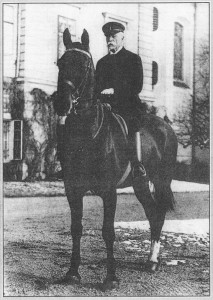October 28: Foundation of Czechoslovakia
By Erin Naillon
An October Holiday
October 28 is a landmark date in Czech history, so much so that many streets around the country bear the name “October 28th Street”.
World War I
 The Czechs and Slovaks had long chafed under the yoke of Austro-Hungarian rule. When a 16-year-old anarchist pointed a pistol and shot to death two members of the reigning family, sparking World War I, the time had come for independence to be declared. With the empire at war, the Czechs and the Slovaks were not only involved but in the center of all the action, whether they wanted it or not. Additionally, the fields of Bohemia and Moravia grew food not for the civilians, but for the Austro-Hungarian army. Supplies were often hidden, to prevent this forced exportation.
The Czechs and Slovaks had long chafed under the yoke of Austro-Hungarian rule. When a 16-year-old anarchist pointed a pistol and shot to death two members of the reigning family, sparking World War I, the time had come for independence to be declared. With the empire at war, the Czechs and the Slovaks were not only involved but in the center of all the action, whether they wanted it or not. Additionally, the fields of Bohemia and Moravia grew food not for the civilians, but for the Austro-Hungarian army. Supplies were often hidden, to prevent this forced exportation.
In 1916, with two years to go before the war ended, the Czechoslovak National Council was formed; two of the founding members were Tomáš Garrigue Masaryk and Edvard Beneš. Rather fittingly, these two men would go on to become the first and second presidents, respectively, of the independent Czechoslovak state. In January of 1918, on Epiphany, a call went out for the support of statehood.
End of a War; End of an Empire
Early on October 28, 1918, the Agricultural Council put a stop to all transports of grain to the front lines. The war was, by now, almost over, and it must have been obvious to nearly everyone. Prague’s famous Wenceslas Square was the venue for yet another famous moment in Czech history: The declaration of independence from Austria-Hungary, and the formation of an independent state consisting of the provinces of Bohemia, Moravia, Silesia, Slovakia, and Ruthenia.
The war ended the following month, and the new state took part in the Paris Peace Conference of 1919. The fledgling country found itself in a rather enviable position; it had most of the industry once belonging to Austria-Hungary (glass, china, machinery, automotive, and more). Czechoslovakia found itself ranked among the top ten industrialized nations in the world. In this new Europe, a post-monarchy world, Czechoslovakia was a democratic state, as it had wanted to be for so long. Culture bloomed; the new country was quite the place to be.
The First Republic
The time after 1918 is known as the “First Republic”. In the early 1930s, the creeping, insidious influence of Hitler and Nazi Germany made itself known. Finally, in 1938, the First Republic ended with the annexation of Sudetenland in the infamous Munich Agreement, helping to pave the way for the horrors of World War II.



